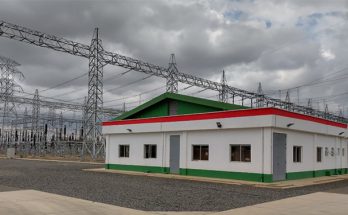 A solar-powered water pump was inspected by Gerard Munyeshuri Gatete on an 8-hectare farm in Barija Sector in Nyagatare District. It pumps water from 60 meters underground to irrigate his crops during drought.
A solar-powered water pump was inspected by Gerard Munyeshuri Gatete on an 8-hectare farm in Barija Sector in Nyagatare District. It pumps water from 60 meters underground to irrigate his crops during drought.
“Before this innovative product, he and family members who own the farm would harvest about one tonne of beans per hectare, but now they harvest almost double,” Gatete said.
The 30-year old said that they got the Rwf22 million system thanks to supporting from Food and Agriculture Organization (FAO), and subsidies from Rwanda Agriculture Board (RAB).
The family paid only 25% of the cost of the technology. It pumps about 3.5 cubic meters of water per hour.
“We used to run farming activities in two seasons only because we could not irrigate. We could not grow watermelons and vegetables because they need a lot of water,” he said, adding that they now grow the crops throughout the year.
Speaking on Wednesday during a training workshop on solar-powered irrigation in Eastern Africa held in Rwanda last week, Rurangwa said the high cost and environmental impact such as gas emissions associated with diesel-fueled pumping systems led FAO to initiate a new technology — a solar-powered irrigation system.
The system, he said, is affordable and environmental-friendly as it makes use of the sun to utilize water, especially underground water for communities living in areas with no water bodies such as rivers, and lakes.
Experts believe that solar-powered irrigation could be a solution to East Africa’s drought-prone agriculture.
According to the World Bank, many communities around the world have limited access to water. To reach deep groundwater reserves, diesel generated electricity is used in rural villages to power electric water pumps despite its high maintenance and diesel fuel requirements, the Bank says.
Rurangwa said that they have since started testing the technology in Uganda, Kenya, Gambia, Niger, Mali, and in Rwanda.
“We will see how it is working, how it can be improved and make it profitable for our communities he said.
According to the World Bank, the price for solar panel reduced by 80% over the last seven years.
Fulgence Nsengiyumva, who is in charge of Agriculture at the Ministry of Agriculture and Animal Resources, said that irrigation plays a pivotal role to help improve farm yield and reduces vulnerability to changing rainfall patterns.
He said as part of efforts to address drought, which threatens Rwanda’s agriculture and food security, the government initiated a sustainable small-scale irrigation whereby it subsidizes the cost of irrigation equipment by 50%.



